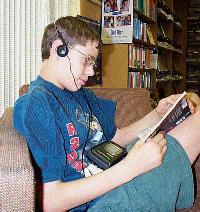

Back to Therapies

A - Although other approaches, including medication, can help a child's ability to pay attention and learn, only effective instruction can teach the skills needed for reading and writing. A child may have missed out on important skills due to deficits in attention, visual perception, language processing, or fine motor coordination. In order to acquire these skills, he needs systematic instruction suited to his learning needs.
Q - I've heard that learning problems may be due to heredity, brain injury, problems with brain "wiring", or a chemical imbalance in the brain. Does this mean my child won't be able to learn to read?
A - NO! Even when physiological factors are involved, the home and school environment is the most important factor in learning. The key ingredients are appropriate instruction, classroom support, and encouragement.
 Q - What is "appropriate instruction"?
Q - What is "appropriate instruction"?
A - Research consistently shows that struggling readers are most successful with reading/spelling approaches having the following characteristics:
Q - What specific reading/spelling approaches are helpful?
A - Many children benefit from programs based on Orton-Gillingham techniques, such as SPIRE, Wilson, and Slingerland. These programs incorporate all of the above characteristics. Training is required to implement most of these programs. Progress is not usually rapid, but skills are learned thoroughly and maintained.
Phonographix is another approach to consider. This program can be implemented at home using the parents' book, Reading Reflex. It emphasizes phonemic awareness and excels in teaching the logic of the alphabetic code. Unlike the Orton-Gillingham approaches, it relies on implicit rather than explicit learning. Some children progress rapidly using this program.
For information on Phono-Graphix, go to ReadAmerica
Q - I was told that my child is a "whole word" or "sight" reader, and should not be taught with phonics.
A - This is a very common misconception, even among teachers. Some children do have a strength in memorizing whole words, and they rely on this in the early grades. Such children typically do well in first grade, but by second or third grade, they begin to struggle. These children typically have poor phonemic awareness. When they encounter an unfamiliar word, they look at the word's first letter and configuration. Then they guess a word that seems to make sense-- sometimes with good results, and sometimes with disastrous ones! In order to progress well in reading, they must learn sound-symbol correspondences and phonemic awareness skills.
Q - Is a whole language approach good for struggling readers?
A - No. Although the whole language trend has enriched many classrooms through its emphasis on high-quality children's literature, it is NOT an effective approach for children who have difficulty learning to read. These children need systematic, explicit decoding instruction with an emphasis on phonemic awareness.
 Q - What kinds of classroom support would my child benefit from?
Q - What kinds of classroom support would my child benefit from?
A - Providing needed modifications can dramatically improve a child's school experience, resulting in less frustration and more mental energy available for learning. If your child has an IEP or a 504 plan, these are some of the types of modifications that can be specified.
Back to Therapies
© 1999-2000, Ruth Donnelly, unless otherwise noted. Photo credits: Lenore Spitznagel